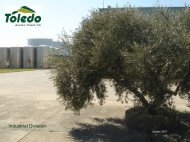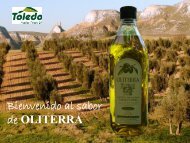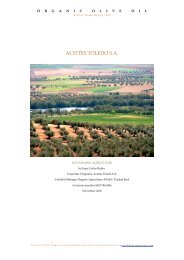On Olive Oil History and Facts. - Aceites Toledo SA
On Olive Oil History and Facts. - Aceites Toledo SA
On Olive Oil History and Facts. - Aceites Toledo SA
Create successful ePaper yourself
Turn your PDF publications into a flip-book with our unique Google optimized e-Paper software.
<strong>Olive</strong> <strong>Oil</strong> <strong>History</strong> <strong>and</strong> <strong>Facts</strong><br />
Refining Industry Description <strong>and</strong> Practices<br />
Page 15<br />
The vegetable oil processing industry involves the extraction <strong>and</strong> processing of oils <strong>and</strong> fats<br />
from vegetable sources. Vegetable oils <strong>and</strong> fats are principally used for human consumption<br />
but are also used in animal feed, for medicinal purposes, <strong>and</strong> for certain technical applications.<br />
The oils <strong>and</strong> fats are extracted from a variety of fruits, seeds, <strong>and</strong> nuts. These include the so<br />
called virgin “lampante” olive oil, already extracted from the olives. The preparation of raw<br />
materials includes husking, cleaning, crushing, <strong>and</strong> conditioning. The extraction processes are<br />
generally mechanical (boiling for fruits, pressing for seeds <strong>and</strong> nuts) or involve the use of<br />
solvent such as hexane. After boiling, the liquid oil is skimmed; after pressing, the oil is filtered;<br />
<strong>and</strong> after solvent extraction, the crude oil is separated <strong>and</strong> the solvent is evaporated <strong>and</strong><br />
recovered. Residues are conditioned (for example, dried) <strong>and</strong> are reprocessed to yield by<br />
products such as animal feed.<br />
Generally speaking, crude oil refining includes degumming, neutralization, bleaching,<br />
deodorization, <strong>and</strong> further refining, but there might be slight differents in cycles <strong>and</strong> processing<br />
systems in use in the different refineries, which adapt their units to the particular oils <strong>and</strong><br />
qualities to be refined.<br />
Spain is the world leader of production of refined olive oil, exporting it to food industries around<br />
the world for many different uses such as the manufacture of olive oil –a blend of refined <strong>and</strong><br />
virgin olive oils-, the fish canning industries –olive oil as a high quality preservative agent-, or<br />
as an ingredient of a wide range of products.<br />
Dem<strong>and</strong> for refined olive oil<br />
The refined olive oil makes its way onto supermarket shelves as ‘lite’, ‘pure’ olive oils, as well<br />
as just plain ‘olive oil’. The general perception of refined olive oil is that it is not as good<br />
as extra virgin <strong>and</strong> that everyone should switch to extra virgin until it completely replaces<br />
refined olive oils. While this would be a commendable achievement, not everyone is as<br />
passionate about extra virgin as some of the producers are. Indeed, those producers<br />
who are simply as unable as unfortunate to produce the extra virgin qualities, have to<br />
sell their virgin lampante oils at a cheaper price, in bulk that goes straight to the<br />
refineries. Every olives producer likes to say that his is the upmost extra virgin, but<br />
reality is very much a different story: lampante olive oils amount to more than 50% of<br />
certain crops.<br />
<strong>On</strong> the other h<strong>and</strong>, many don’t like the strong taste of extra virgin, <strong>and</strong> most don’t like the<br />
price. In foodservice, extra virgin olive oil is generally used as a condiment – refined oil<br />
is used as a cooking medium where a bl<strong>and</strong> <strong>and</strong> cheaper oil is needed which is<br />
affordable <strong>and</strong> doesn’t impart any flavour to the food. The same applies to olive oil used<br />
in the manufacture of foodstuffs, such as margarines, <strong>and</strong> cosmetics.









